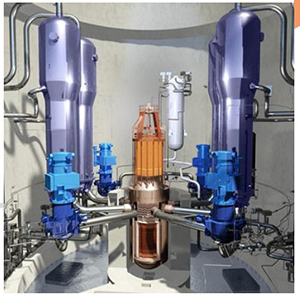 |
||
Home > TERATEC FORUM > Workshops > Workshop 1
Workshops - Wednesday June 12
Workshop 1 - 09:00 to 12:30
Digital Twins: from "concept" to industrial implementation
Animated by Laurent ANNE, DISTENE
EDF Digital Reactor: perspectives and new challenges
 |
EDF has a long history with numerical simulations of the nuclear power plant. Not only it has been developing and maintaining, in house, numerical codes for all relevant physics such as neutronics, thermal-hydraulics, mechanics… but it also owns some quite computer horsepower for numerical simulations. For instance its last computer cluster, GAIA, has been ranked 97th in the Top500 list in November 2018.
It is therefore not surprising that it has created and used for many years now, digital versions of the nuclear reactor. Those versions are specialized, depending on the context, for operators training, design and safety studies as well as the physics analysis of extreme situations hard to create in the real world. However, since not all use cases require the same level of physics fidelity, and since numerical horsepower was limited, EDF has many kinds of simulations types, each suited for a given situation. |
|---|
This is the idea behind the Digital Reactor, the digital twin of the nuclear power plant. In this approach, less demanding accuracy situations will benefit from codes and methods that have been used only, until now, from more accurate situations.
Methodology: A consortium led by EDF and composed not only of key actors from the nuclear field, but also of innovative SME and academic institutions, has already started to work on this 4 years long project.
Challenges: 15 scientific locks and 7 interoperability standards that need to be implemented have been identified.
HPC in the project:
-
Since we want high level codes to replace less accurate ones, we need them to be very efficient on local machines. This can be achieved taking into account vectorization and parallelization on multicores CPUs. Efficient parallelization on computer clusters is also very important for all codes since we need parametric calculations (in the order of millions for a single study).
-
Multi-physics coupling with some highly parallelized codes require development of new algorithms as well as efficient data structures in order to prevent bottlenecks (we may have to rethink data workflow).
-
In the context of high parallelism, we have to start thinking how codes should handle hardware failures.
-
The quantity of data used, exchanged and archived by the codes can reach up to terabytes for a single simulation. Data models need to be thought carefully if we want to be efficient.
-
Finally, since a Digital Reactor is a complex object, we need to make sure we master data all along the simulation tool chain from manipulation, to coherency, up to traceability. Automaton is key regarding to the huge amount of data we are dealing with.
 |
Biographie : Salli Moustafa - Après ses études de mathématiques appliquées à l'Ecole Centrale Paris (P2012), Salli a effectué une thèse de doctorat en informatique chez EDF en partenariat avec l'INRIA. Aucours de cette thèse, il travaille sur la problématique de simulation du transport de neutrons dans les coeurs des réacteurs nucléaires. Ces simulations, pouvant impliquer jusqu'à 1000 milliards d'inconnues, sont très consommatrices de ressources de calcul. Salli a donc étudié et mis en oeuvre une méthode de parallélisation hiérarchique tirant parti de tous les niveaux de parallélisme disponibles sur un super-calculateur moderne. Il arrive chez ANEO en 2016 au sein du département Advanced Computing Technologies et intervient chez nos clients sur des sujets autour du développement d'applications hautement performantes. Il a notamment travaillé chez Nielsen sur des problématiques d'analyse de données massives dans l'écosystème Hadoop. Il est actuellement en mission au CACIB pour la migration, vers le scheduler de tâches IBM Symphony, d'une application de calcul de prix d’options financières. Il participe également à l'audit d'une application de calcul de risques actuarielles chez AXA, en vue de son optimisation. Au sein du cabinet, il est formateur sur le volet HPC (comment développer et optimiser une application). En plus de son activité de consulting, il dispense des cours de programmation parallèle à l’UPMC. Son expérience en calcul distribué lui a conduit à concevoir SeWaS (https://github.com/aneoconsulting/SeWaS), un code de calcul open-source permettant de simuler la propagation d'une onde sismique. Ce code implémente les approches de programmation innovantes (Task-based model; C++14; Expression Templates; Vectorisation) et adaptées pour les plateformes de calculs modernes (x86; ARM; Power; GPU). Les études de performances ont montré que ce code se compare favorablement avec des codes similaires. |
|---|---|
| Biography : Matthieu Guillo, PhD in particles physics from the University of South Carolina, he began his career at CEA in 2002, at the Nuclear Energy Division. He helped developing new calculation schemes for the AREVA group. He later joined the EDF group in 2007 to develop a new neutronics code, named COCAGNE. He specialized in software architecture and implemented various new mathematical models within COCAGNE. From 2012 to 2017, he is Project Manager deputy at the French Nuclear Institute (EDF-CEA-FRAMATOME) for 3 projects : Software Development for nuclear simulations, Experiments in support of the validation of the codes, and finally Nuclear Data Evaluation. Since 2017 he is working on defining the contents and perimeter of a new Project : Digital Reactor. |
Register now and get your badge here
- TERATEC Forum is strictly reserved for professionals.
- Participation to exhibition, conferences and workshops is free (subject to seats available)
- On line registration is obligatory to attend exhibition, conferences or the workshops.
- The Vigipirate security plan being raised to its highest level, it is mandatory to register online in advance and come with an identity card order to participate in TERATEC Forum.
- The badge is free of charge and give you access to all events TERATEC Forum.
For any other information regarding the workshops, please contact :
Jean-Pascal JEGU
Tel : +33 (0)9 70 65 02 10
jean-pascal.jegu@teratec.fr
Campus TERATEC
2, rue de la Piquetterie
91680 BRUYERES-LE-CHATEL
France